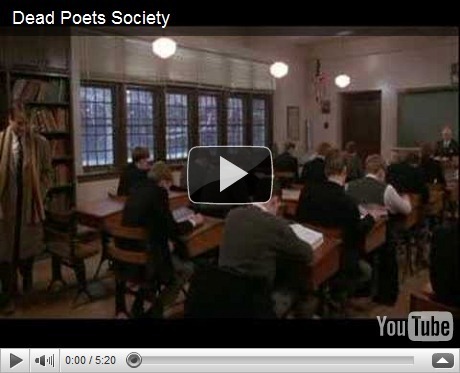The real end to Dead Poets Society
We all know the ending of Dead Poet's Society. Right?
If you don't, shame on you. Go watch the movie. I'm about to spoil it.

At the end of the film, a handful of boys who were compelled to falsely testify against their teacher take a stand (literally), demonstrating their allegiance to for him in a moving tribute to his teaching.
It's a scene that makes many people cry. Not me, but many.
But here's my question:
What happens when these boys finish school, and perhaps finish college? What do they do once the shackles of the their restricted teenage existences are thrown off?
I always find it amusing to watch high school teachers and college professors, both in film and real life, treat students unjustly.
What are these educators thinking?
Do they fail to realize that these seventeen year olds will soon be eighteen, and soon after that twenty-one?
Do they forget that these young men, once powerless to fight the system, could soon return seeking retribution and vengeance?
I like to think that the boys from dead Poet's Society, Knox and Charlie and Meeks and Pitts, return to Welton Academy as young men, demanding justice. I like to imagine them barging into the headmaster's office, pushing his indignant ass back down into a chair, and telling him that they are not children anymore.
"You can't bully us with threats of expulsion and the arm-twisting of our parents anymore, old man! Did you really think that we were going to forget the lies you forced us to tell? Did you really think you could bully boys who were about to become men and not pay a price?"
And then I like to imagine those boys-turned-men spending every waking hour of their lives for the next six months ensuring that the headmaster is fired and Mr. Keating's reputation is restored.
And I'd like to see Charlie kick Cameron's ass once more.
The symbolic standing-on-desks moment was nice, but I am much more vindictive than that.



